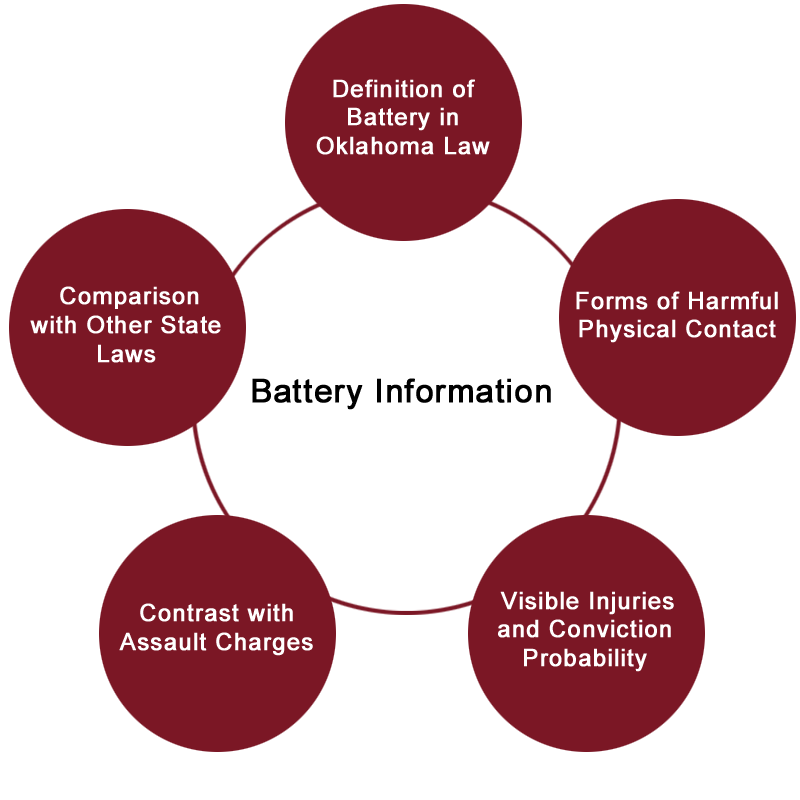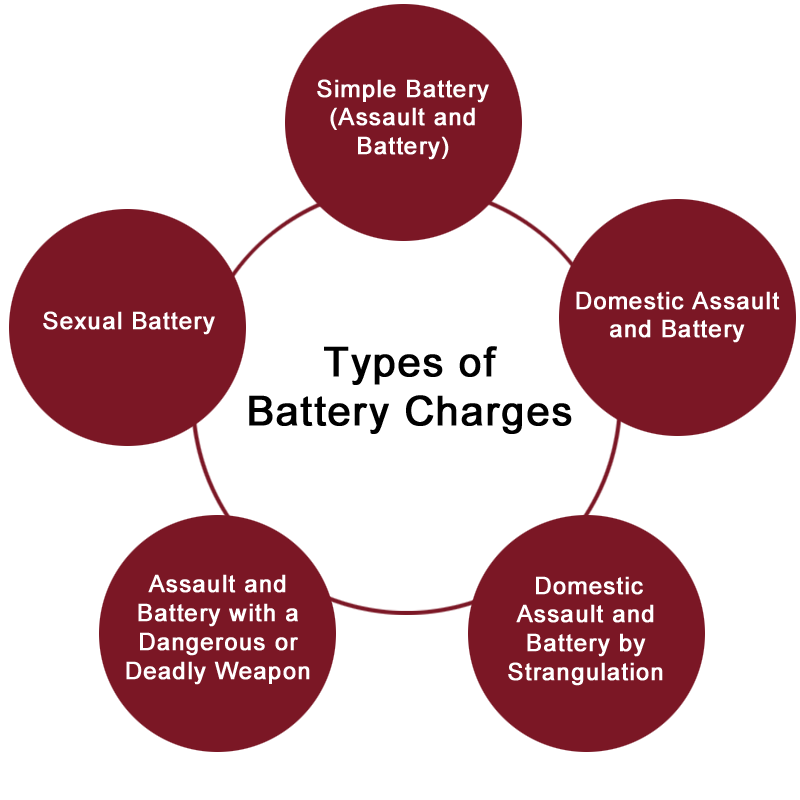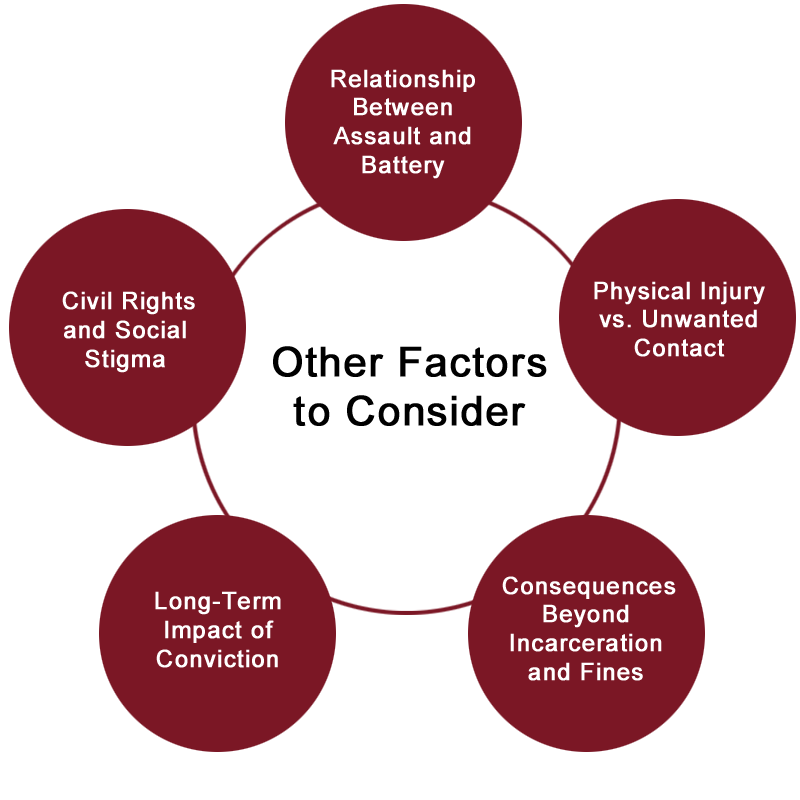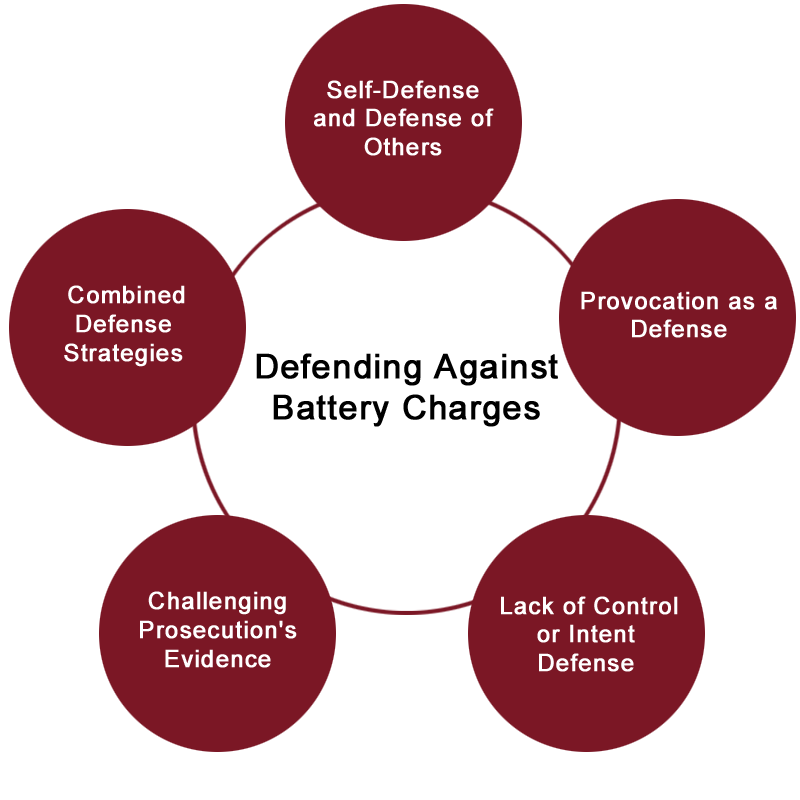Battery in Oklahoma
 As outlined in Oklahoma law, specifically Oklahoma Statutes Title 21 §21-642, battery is defined as “any willful and unlawful use of force or violence upon the person of another.”
As outlined in Oklahoma law, specifically Oklahoma Statutes Title 21 §21-642, battery is defined as “any willful and unlawful use of force or violence upon the person of another.”
This is similar to the definition used by most other states, that battery charges can arise from any unwanted physical contact or injury. While a conviction can arise from simply proving that harmful physical touch occurred – be it a push, a shove, a slap, a punch or use of a foreign object such as a knife or club – visible injuries such as contusions or swelling can increase the chances of a conviction.
This contrasts with a charge of assault, which the state of Oklahoma defines under §21-641 as “any willful and unlawful attempt or offer with force or violence to do a corporal hurt to another.” Essentially, an assault conviction does not require physical contact – it can merely be a threatening gesture or action which creates a reasonable fear of bodily harm. A battery charge does require actual use of force through physical contact.
 What are the Different Types of Battery Charges?
What are the Different Types of Battery Charges?
The least severe charge of battery is called Simple Battery (often Assault and Battery). Generally treated as a misdemeanor in the state of Oklahoma, simple battery charges result when one person physically harms another and upon conviction can result in a 90-day stint in county jail and fines up to $1,000. Beyond simple battery, however, there are several other varieties of battery charges including:
- Domestic Assault and Battery: Defined as battery within certain familial relationships. This can carry consequences that include several months in county jail and fines up to $5,000.
- Domestic Assault and Battery by Strangulation: Similarly framed within household relationships, this charge stems from attempted choking.
- Assault and Battery with a Dangerous or Deadly Weapon: Considered a felony offense, this charge results when a weapon of any kind is involved. As a felony, it carries a jail term of a year or more in state prison and hefty fines.
- Sexual Battery: This charge stems from battery conducted in an inappropriate or implicitly sexual manner.
- Aggravated Assault and Battery: Considered a felony, these charges are often used when the victim displays physical evidence of grievous injury, from broken bones to disfigurement. This can carry a prison sentence between 1-5 years in state prison as well as substantial fines.
- Assault and Battery on a Police Officer: Considered a felony, these charges arise when the victim is an agent of law enforcement and carry a multiple-year prison sentence and massive fines.
- Assault and Battery with Intent to Commit a Felony: Considered a felony offense on top of the intended felony, this charge carries a prison sentence of several years along with fines.
- Assault and Battery Causing Great Bodily Harm: If the victim is several injured, these charges can increase the penalties of a simple battery charge, with a prison term of several years and increased fines.
 Other Factors to Consider
Other Factors to Consider
Simple battery is often referred to as assault and battery as the two crimes are often charged together, representing the two distinct phases of an incident of violence. As assault involves the threat of violent harm and battery the execution of that threat, the one generally results in the other. By issuing charges for both, prosecutors are able to more effectively address the initial threat and resulting altercation.
As the root of both assault and battery stems from simple unwanted contact, it is possible for charges to result without any kind of physical injury. In addition, various factors involved in the inciting incident can play a role in whether a battery charge is treated as a misdemeanor or a felony.
And beyond the incarceration and fines outlined above for the various types of battery charges, a conviction can have several added consequences. These range from probation and community service to mandatory counseling. Those convicted may also be placed under restraining order by the victims and be required to pay them financial restitutions.
Beyond that, the long-term consequences of a conviction can be impactful for years. A battery charge on a person’s permanent criminal record can lead to a loss of certain civil rights such as voting and firearm ownership, as well as difficulties securing employment or housing. That’s to say nothing of the social stigma they will face, and the ensuing personal stress, as a convicted criminal.
 Defending Against Battery Charges
Defending Against Battery Charges
If you or a loved one has been charged with battery, there are several ways that an attorney can mount an effective defense. Several strategies include:
- Acting in Self-Defense or Defense of Others: This defense aims to prove that the defendant felt that there was an imminent threat of harm to themselves or those around them and used force as a means of defense.
- Provocation: Less of a justification for the defendant’s actions, this defense aims to provide context to the judge or jury regarding their actions, helping to explain their actions during the inciting incident.
- Lack of Control or Intent: Another defense that doesn’t necessarily require justifying the defendant’s actions, this strategy shows a judge or jury that the defendant was not in full control of their actions due to extenuating circumstances such as intoxication, and that their actions were unintentional.
- Challenging the Prosecution’s Evidence: As the burden of proof rests on the prosecution to demonstrate guilt, this strategy undercuts the validity of their argument by undermining the evidence they’ve gathered. Whether that means establishing an alibi or disputing forensic accuracy or police procedures, this strategy aims to diminish the case against the defendant.
Any or all of these strategies used together can provide a compelling case for the defendant, while creating reasonable doubt regarding the prosecution’s case.
How We Can Help
At Hunsucker Legal Group, we know that a charge of battery does not mean a conviction. And we’ve proven that time and time again through our comprehensive approach to creating a compelling defense. Our attorneys work relentlessly to have your charges reduced or dismissed, methodically working through every scrap of evidence to create a thoroughly researched defense and a depth of knowledge that that prosecution simply can’t match.
It requires a resolute dedication to your case, but that’s something which has been a cornerstone of the Hunsucker Legal Group since the beginning. When you hire us, you don’t just get an attorney. You get an entire team devoted to your freedom. You’re more than just a case to us. You’re more than just a number on a docket. You are a person who deserves nothing less than the best defense against the charges put before you.
Take a look at the more than 600 positive reviews on Google and you’ll see what a difference this approach can make. Then, when you’re ready, provide your contact information below for a free no-obligation consultation.
